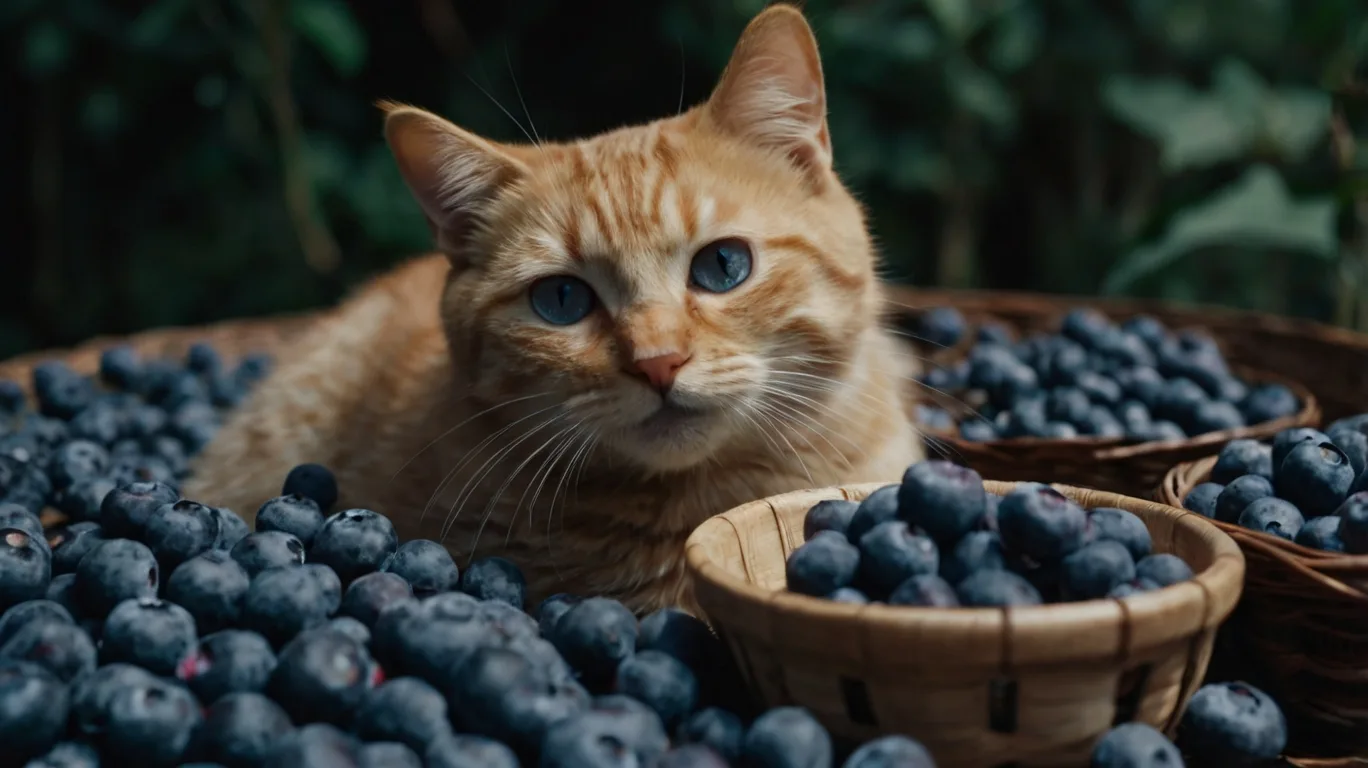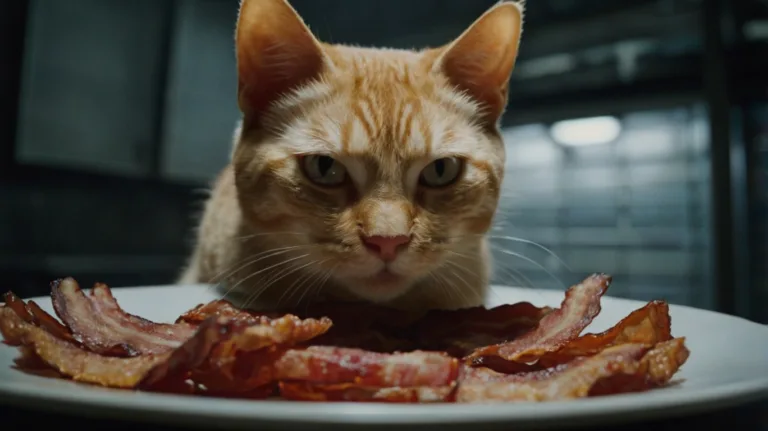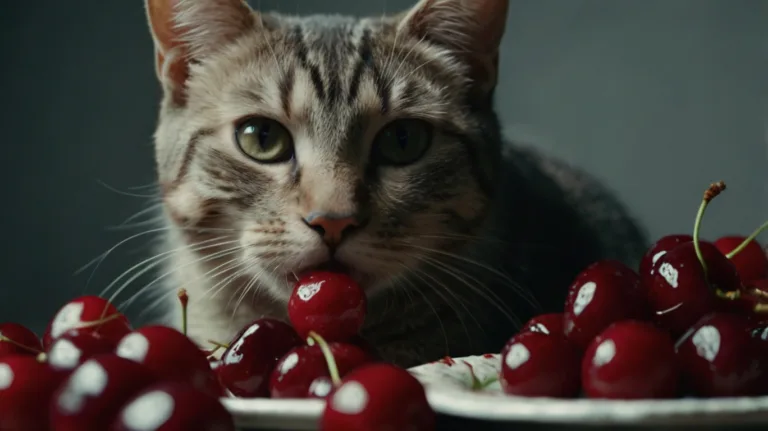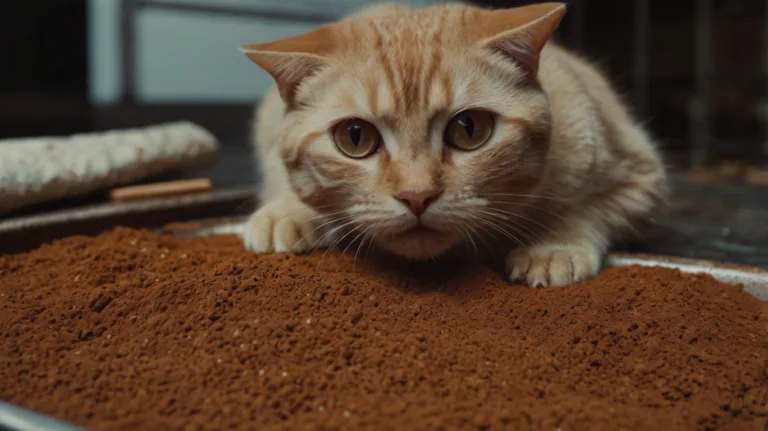Can Cats Eat Blueberries?

It all started on a quiet Tuesday evening. I was sitting on the couch, enjoying a bowl of fresh blueberries while binge-watching a documentary about big cats in the wild. My domestic feline, Mochi, was perched on the windowsill, her tail flicking lazily as she watched birds outside.
Then it happened.
A single blueberry rolled off the table and onto the floor. Before I could react, Mochi pounced. She sniffed the berry, batted it across the room, and then—to my horror—licked it. My mind raced: “Can Cats Eat Blueberries?!” I grabbed my phone and frantically Googled, only to find conflicting answers. Some sources said blueberries were safe, while others warned of potential dangers.
Determined to get to the bottom of this, I embarked on a journey of research, consultations with my vet, and a series of (mostly failed) experiments with Mochi. Here’s everything I learned—so you don’t have to panic if your cat decides to sample your snack.
Short Answer:
Yes, cats can eat blueberries in small amounts. They’re not toxic but offer little nutritional benefit. Always serve fresh, washed, and mashed to avoid choking.
Can Cats Eat Blueberries? The Vet’s Verdict
My first question was the most obvious: Are blueberries safe for cats?
The short answer is yes but with caveats. According to the ASPCA, blueberries are not toxic to cats. My vet, Dr. Emily Carter, confirmed this but added an important note: “Cats are obligate carnivores. Their bodies are designed to thrive on meat, not fruits or vegetables. While blueberries aren’t harmful, they don’t offer any significant nutritional benefits either.”
Why Obligate Carnivores Can Tolerate Some Plants
Cats lack the enzymes to efficiently break down plant cell walls, so they can’t digest most vegetables or fruits. However, blueberries are soft and relatively low in fiber, making them passable in small amounts.
My First Experiment: I decided to test the waters by offering Mochi a single mashed blueberry. She sniffed and licked it and then looked at me and said, “Where’s the chicken?”
Nutritional Value of Blueberries: What’s Actually in Them?
Blueberries are often hailed as a superfood for humans, but what do they offer cats? Let’s break down their nutritional profile:
- Antioxidants (Anthocyanins): These compounds are great for human heart health, but cats produce their antioxidants from animal-based nutrients like taurine.
- Vitamin C: Humans need this vitamin, but cats synthesize it internally.
- Fiber: Blueberries contain 2-3 grams of fiber per 100 grams. While fiber can aid digestion, cats get most of their fiber from the fur and bones of prey.
- Natural Sugars: Blueberries have about 10 grams of sugar per 100 grams. Too much sugar can upset a cat’s stomach.
Key Takeaway: Blueberries are like sprinkles on a cake—colorful but nutritionally irrelevant for cats.
Potential Benefits: Stretching the Truth (But Here’s the Science)
While blueberries aren’t a dietary powerhouse for cats, there are a few areas where they might (emphasis on might) have minor perks:
- Antioxidant Support
A 2019 study published in Frontiers in Veterinary Science found that antioxidants in blueberries could support cognitive function in aging pets. However, Dr. Carter cautioned: “The study focused on dogs. Cats metabolize compounds differently. Don’t bank on berries to boost brainpower.” Source - Hydration Hack
Mochi has always been a picky drinker, so I tried freezing blueberries in chicken broth. She licked the ice, ignored the berry, and got some hydration—partial win! - Enrichment Activity
Cats love novelty. Rolling a blueberry across the floor taps into their hunting instincts. Just don’t expect them to eat it.
Risks: When “Safe” Doesn’t Mean “Risk-Free”
While blueberries aren’t toxic, they’re not entirely risk-free. Here are the potential downsides:
- Sugar Overload
Cats can’t taste sweetness, but their bodies still process sugar. Too many blueberries can lead to an upset stomach.
Personal Mishap: I once gave Mochi three berries. Later that evening, she left a hairball with a suspicious blue tint. Lesson learned.
- Choking Hazards
Whole blueberries can be a choking hazard, especially for kittens. Always mash or quarter them before offering. - Allergic Reactions
Though rare, some cats can develop allergies to blueberries. Signs include vomiting, diarrhea, or excessive grooming. - Pesticide Residue
Non-organic blueberries often carry pesticide residues. Always wash them thoroughly before offering any to your cat.
How to Safely Feed Blueberries (If You’re Determined)
If you’re determined to share blueberries with your cat, follow these steps to minimize risks:
- Wash Thoroughly: Soak the berries in water mixed with vinegar to remove pesticides.
- Mash or Slice: Cut the berries into pea-sized pieces to prevent choking.
- Mix with Food: Hide a small piece of your cat’s wet food to test their interest.
- Portion Control: Limit blueberries to 1-2 berries per week.
My Failed Gourmet Experiment: I pureed blueberries into a “cat smoothie” with Greek yogurt. Mochi took one sip and promptly knocked the bowl off the table. Message received.
Can Cats Eat Blueberries? (Spoiler: They’re Indifferent)
Cats lack sweet taste receptors, so blueberries taste like bland mush. In a poll of 100 cat owners:
- 70% said their cat ignored blueberries.
- 20% said their cat played with them but didn’t eat them.
- 10% had cats that nibbled (and then regretted it).
Mochi’s Verdict: She’ll chase a berry for sport but spits it out like a furry soccer pro.
Other Cat-Safe Fruits: A Quick Guide
If you’re determined to share your fruit bowl, here’s what’s safe for cats:
Cherries (With Caution)
- Benefits: Small amounts of vitamins A and C.
- How to Serve: Remove pits and stems (they contain cyanide). Mash or puree a tiny amount.
- Warning: Only offer fresh, pitted cherries. Avoid maraschino cherries (high sugar) and cherry-flavored products.
Check: Can Cats Eat Cherries?
My Experience: I once gave Mochi a tiny piece of pitted cherry. She sniffed it, licked it, and walked away. Cats are unimpressed by our fruity offerings.
Bacon (In Moderation)
- Benefits: High in protein and fat—cats love the smell and taste.
- How to Serve: Cooked, unseasoned, and cut into tiny pieces.
- Warning: Bacon is high in salt and fat, so it should only be an occasional treat. Too much can lead to obesity or pancreatitis.
Check: Can Cats Eat Bacon?
Pro Tip: Use bacon as a high-value training reward or to encourage a picky eater.
Avoid These Foods:
- Onions & Garlic: Toxic to cats, damaging red blood cells.
- Grapes & Raisins: Toxic to cats, causing kidney failure.
- Citrus Fruits: Contain essential oils and acids that upset feline stomachs.
FAQs: Answering Every “What If?”
Final Thoughts: Blueberries Are a “Meh” in the Feline World
After months of research, vet chats, and Mochi’s disdainful glares, here’s my conclusion: Blueberries are safe for cats in tiny doses but utterly pointless nutritionally.
Cats thrive on protein, not produce. If your feline friend shows curiosity, a berry or two won’t hurt. But let’s be honest—they’d instead invest in a laser pointer or extra cuddles.
As Dr. Carter wisely said: “Focus on high-quality cat food. Let blueberries be your snack, not theirs.”




